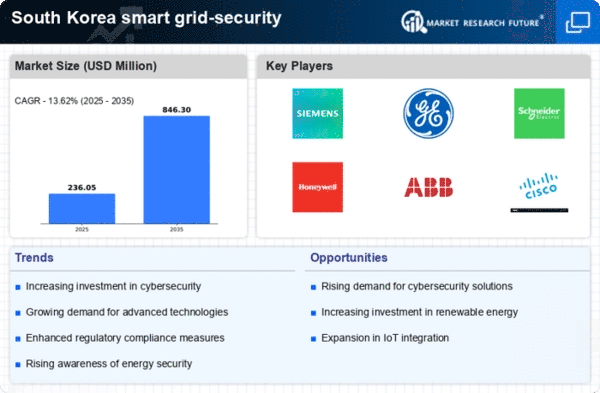Rising Demand for Energy Resilience
The increasing demand for energy resilience in South Korea is a pivotal driver for the smart grid-security market. As the nation faces challenges related to energy supply and reliability, stakeholders are investing in advanced security measures to protect critical infrastructure. The government has set ambitious targets for renewable energy integration. This necessitates robust security protocols to safeguard against potential cyber threats. In 2025, the smart grid-security market is projected to grow by approximately 15%, driven by the need for enhanced resilience against disruptions. This trend underscores the importance of securing energy systems to ensure uninterrupted service and maintain public trust in energy providers.
Increased Awareness of Cyber Threats
The heightened awareness of cyber threats among stakeholders in South Korea is driving the smart grid-security market. As incidents of cyberattacks on critical infrastructure become more prevalent, energy companies are prioritizing security investments. This awareness has led to a shift in organizational culture, where security is now viewed as a fundamental component of operational strategy. In 2025, the market is projected to grow by 18% as companies seek to implement comprehensive security measures to protect their assets. This trend highlights the necessity for ongoing education and training to equip personnel with the skills needed to combat cyber threats effectively.
Integration of IoT in Energy Systems
The integration of Internet of Things (IoT) technologies in energy systems is a significant driver for the smart grid-security market in South Korea. As IoT devices proliferate within the energy sector, they introduce new vulnerabilities that necessitate enhanced security protocols. The interconnected nature of these devices requires a comprehensive approach to security, addressing potential entry points for cyberattacks. By 2025, the smart grid-security market is expected to expand by 22%, largely due to the increasing deployment of IoT solutions. This growth underscores the importance of developing robust security frameworks to protect against the unique challenges posed by IoT integration.
Technological Advancements in Cybersecurity
Technological advancements in cybersecurity are significantly influencing the smart grid-security market in South Korea. Innovations such as artificial intelligence (AI) and machine learning (ML) are being integrated into security frameworks, enabling real-time threat detection and response. These technologies enhance the ability to monitor and mitigate risks associated with smart grid operations. In 2025, the market is expected to witness a surge in demand for AI-driven security solutions, with an estimated growth rate of 20%. This evolution reflects the necessity for sophisticated security measures to counteract increasingly complex cyber threats targeting energy infrastructure.
Government Initiatives for Smart Grid Development
Government initiatives aimed at smart grid development are a crucial driver for the smart grid-security market in South Korea. The government has launched various programs to promote the adoption of smart grid technologies, which inherently require enhanced security measures. Investments in infrastructure modernization and the establishment of security frameworks are essential to protect these systems. By 2025, it is anticipated that government funding for smart grid projects will exceed $1 billion, further propelling the demand for security solutions. This proactive approach indicates a commitment to ensuring the safety and reliability of energy systems in the face of evolving threats.
















